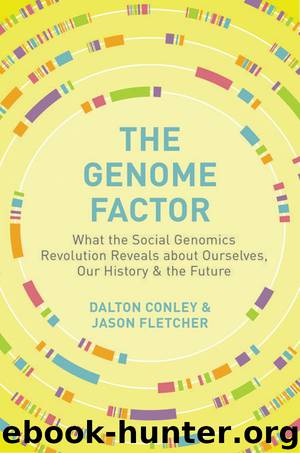The Genome Factor: What the Social Genomics Revolution Reveals about Ourselves, Our History, and the Future by Dalton Conley & Jason Fletcher

Author:Dalton Conley & Jason Fletcher
Language: eng
Format: epub
Publisher: Princeton University Press
Published: 2016-04-19T04:00:00+00:00
CONCLUSION: WHITHER GENOTOCRACY?
One effect of the social genomics revolution that is not yet fully felt is how people will deal with and understand genetic information about themselves and their loved ones. Now that genetic data are becoming widely available, how will this new knowledge be used by the larger populace—that is, big data meets big public? Who will translate this so-called language of life for nonspecialists—those of us who know only snippets of the relevant words and concepts and who have not thought about biology or genetics since high school or college? How do we sift through the clutter of raw data, false positives, and real risks, especially when much of it is in a language that most of us do not understand?
Nowadays, you can spit into a cup, mail the contents to 23andme or a similar company, and enter your credit card information online. About four weeks and a hundred dollars later, you will have access to one million bits of information about your genome, such as whether you have the genetic variant TA or AA or TT (a million times across your genome). For nearly everybody, this unfiltered information is completely useless. It is similar to trying to read the ones and zeros of a digital computer file for the first time. The ones and zeros tell you what a machine (your cells and body) is programmed to do, but no one knows yet how to read the complete text to understand what the program will do under different circumstances. Geneticists have assigned phenotypic relevance to some of these data, but otherwise they remain a mystery. In the early days of the industry, 23andme and similar companies would also send you an assessment—translating these TAs, AAs, and TTs for you. They might send you pie charts, line graphs, and summaries such as “your odds of having a stroke are 20 percent higher than average”; “your odds of developing Alzheimer’s disease are 18 percent higher than average”1—scary stuff.2 But the FDA has ruled that these assessments are basically junk.3 For a number of years these companies could only send you assessments about your genetic heritage—that you may have distant cousins in Kenya (or Texas) or have a lot of Neanderthal DNA in your genome. (However, in February 2015, the FDA decision was partially rolled back by allowing companies to describe specific genetic risk factors on a smaller class of inherited health conditions. Stay tuned.4)
But this regulatory hurdle is really just a hiccup. It will not be long before you can hire companies to take your genetic data and create polygenic scores for anything—from educational attainment to BMI to entrepreneurship proclivity to risk of depression. And these scores will become more accurate over the next decade in their capacities to predict. Right now a polygenic score predicts about 6 percent of the variance in educational attainment among populations of European descent, but some think it will get close to 20 percent (or higher) over time. (Even with low predictive power,
Download
This site does not store any files on its server. We only index and link to content provided by other sites. Please contact the content providers to delete copyright contents if any and email us, we'll remove relevant links or contents immediately.
Enlightenment Now: The Case for Reason, Science, Humanism, and Progress by Steven Pinker(7303)
A Journey Through Charms and Defence Against the Dark Arts (Harry Potter: A Journey Through…) by Pottermore Publishing(4795)
The Immortal Life of Henrietta Lacks by Rebecca Skloot(4570)
A Journey Through Divination and Astronomy by Publishing Pottermore(4373)
Elon Musk by Ashlee Vance(4117)
Origin Story: A Big History of Everything by David Christian(3679)
COSMOS by Carl Sagan(3615)
Alchemy and Alchemists by C. J. S. Thompson(3506)
Bad Pharma by Ben Goldacre(3415)
Enlightenment Now by Steven Pinker(3363)
Shadow of Night by Deborah Harkness(3350)
Inferior by Angela Saini(3308)
A Mind For Numbers: How to Excel at Math and Science (Even If You Flunked Algebra) by Barbara Oakley(3290)
Origin Story by David Christian(3191)
The Code Book by Simon Singh(3167)
Signature in the Cell: DNA and the Evidence for Intelligent Design by Stephen C. Meyer(3122)
The Elements by Theodore Gray(3048)
A Brief History of Time by Stephen Hawking(3013)
A Journey Through Potions and Herbology (A Journey Through…) by Pottermore Publishing(2843)
